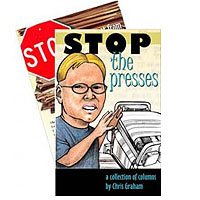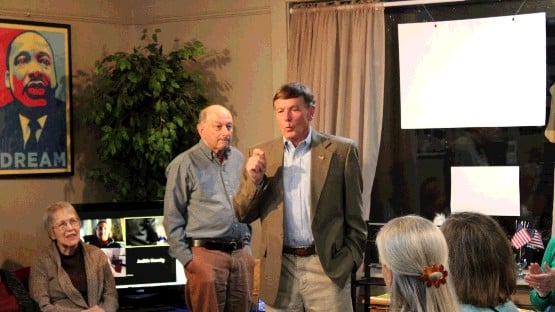
I’m an alum of the Augusta County school system, from kindergarten through grade 12. The closest thing we got to any kind of education in world religions came via something called Weekday Religious Education.
WRE covered one of the world’s religions, Christianity, and it pushed a certain version of it, if I can say it like that.
For those who have taken to commenting on the issue at Riverheads over a calligraphy lesson that had students seeking a sticker to go toward knocking their lowest grade of the grading period off their ledger by copying the shahada, the Islamic statement of faith, Augusta County is among a number of school districts that offer, ahem, voluntary evangelical Christian education on a weekly basis.
Voluntary is an interesting word for WRE. You had to sign up and have parental permission, sure, but it was only voluntary in the sense that, if you signed up, good on you, you weren’t the weird kid.
There was one kid in my class in elementary school who didn’t go to WRE. His presence also made it so that we couldn’t call it a Christmas concert, or have a Christmas party before Christmas break, or whatever they could call it.
That kid wasn’t popular, if you can imagine that.
WRE ended when you got to high school, where we had World History, which was a joke. Nothing about anything remotely recent in that class. I’m not sure we even got to the Middle Ages that year, it was so poorly done.
When I got to college, I finally had the chance to learn about the rest of the world. My major was in constitutional law, and the list of classes that I could take from other disciplines included courses in world religions.
Here we go! I ended up taking classes beyond the requirements so that I could cover as many of them as possible. I did a two-part course in the History of Christianity, another that treated the New Testament from the perspective of literary criticism, complete with the full historical context of the various books contained therein.
I was also able to study, from an academic perspective, Islam, Buddhism, Taoism, Hinduism, the teachings of Confucius.
Now, here’s where the parents concerned about their kids being indoctrinated can use me as an example of what they’re getting at: I broke away from the evangelical Christianity that I’d been exposed to as a kid.
Not that my mother would care. God rest her soul, she passed away in September from cancer, and among her dying wishes were that we not have any preachers speaking at any memorial services, because she was fervently agnostic, and yes, for those of you who think that you have to go to church and be baptized and the rest to be fervent about something, you can be a fervent agnostic.
That’s what I am now, have been for years, actually.
Just to be clear, being agnostic doesn’t mean you’re an atheist, that you believe nothing, not that there’s anything at all wrong with that. A friend posted a snarky comment on my Facebook wall about me not understanding what it means to have faith in something, and he couldn’t be further from understanding where I am than to believe that.
I see myself viewing the world from a sort of overview perspective. Christians see the world one way; actually, Christians even disagree with each other, Catholics and Protestants, Protestants breaking down into multiple belief systems themselves. But you have Christianity, Judaism – yep, lots of differences of opinion within Judaism.
Then you have Islam. Plenty of discord within Islam. You have a billion Hindus, and Buddhists.
There are as many religions as there are peoples, to cut to the chase. They’re all looking to be part of something bigger, to make sense of life, to develop and follow guidelines for good living, and they’re all convinced that their way is the right way.
I’m only convinced of one thing: that there is a higher power, and that none of us have any idea beyond that.
And, to add to that, that those of us who are most convinced that their way is the right way can also be among the most dangerous.
I was already on this track as a kid because my mother, and her mother before her, had similar anti-establishment misgivings.
I feel fortunate that I was able to further explore theology as a college student, but that was purely by happenstance. A constitutional-law major that encourages students to study world religions? That was a break. And my high-school teachers had tried to push me to study engineering. I’m sure my free time for studying religion then would be limited at best.
The kids coming up through Augusta County schools today get to expose themselves to world religions as part of the high-school civics curriculum.
For the vast majority, it will have no impact on what they believe, as I think is the case with me, considering my own upbringing. Reading the textbook at the heart of the generated controversy at Riverheads High School, it’s benign, cursory, treating the subject matter appropriate for a basic history course. You’re not going to read the lessons about Buddhism and say, hey, don’t know why I think this way, but what I’ve been learning in Sunday school is a load of crap.
I would also hope that the exposure will provide some level of enlightenment and understanding about where other people derive their world-views from.
I don’t have to agree with how Sunni Muslims see the world, or how Jews see the world, or Hindus see the world, or but I can at least know a little bit about what they believe, how they worship, how their religion evolved over time, that kind of thing.
Most kids in Augusta County schools aren’t going to college, and I wouldn’t suggest that they should, or that it’s a bad thing that they don’t. We need to put more emphasis on vocational and career education, which is another discussion for another day.
This puts a premium on having our high-school civics curriculum do more than it did in my day, which was practically nothing. Good history classes, good government classes, I’d put a good word in for a sociology class of some sort, and then world religions, can form a basis for building good citizens when our kids become the workers and business owners and parents of tomorrow.
I’m jealous of the kids of today because they’re getting the kind of education in the Augusta County school system that my generation didn’t have access to.
And now I’m frustrated that we’re having this national discussion about our schools that I fear will roll back the progress that our school system has made over the past 30 years.
– Column by Chris Graham










